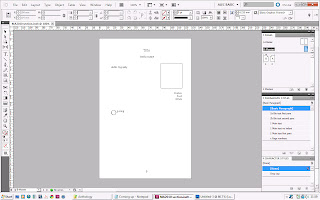I was going to call this post 'Money', but then that would have been two Amis Junior titles in a row, and that would be immoral. But money is certainly what this is about.
The obvious question for a project like this is how much the ruddy thing is going to cost. That's for a paperback book of around, say, 400 pages, and a small (I like to think of it as bijoux, but that's probably because I spent several years working in Kensington. That kind of place does something to a fellow, what?) print run of 150 copies.
Inevitably, the answer is 'it depends'. And the things it depends on are:
Paper thickness
This wasn't something that could be worked out with a ruler: my eyesight isn't that good (nobody's is in publishing). This applies to both the inner pages and the cover. In both cases the anthology wants to carry on with its plan of looking as much like a normal paperback book as possible: something that won't tear or fall to bits, but not something you can't pick up without back support.
The standard weights for this are 80gsm or 90gsm (grammes per square metre) for inside pages and 300gsm for the cover. That'll do us. The 80/90 decision will come down to price - 90 would be pleasant, if we can afford it.
Binding
There are various fancier forms available, but the basic, classic, standard, call-it-what-you-will version is perfect binding, as seen in most paperbacks: the pages are just glued into the cover. I have no idea why the cheapest form is called 'perfect'.
Colours and contents
Our inside is going to be all black and white, and nearly all text. Ideally we'd like to include black and white photos of the authors, but that will depend on what the printers can offer, and, more importantly, how much it costs. For covers we want the option of being full-colour, which in printing terms means four-colour - CMYK (cyan, magenta, yellow and, er, black).
Next you get in touch with a few printers, preferably those specialising in short print runs, and see what they'll charge for 150 copies, 400 pages, 80/90gsm b&w text pages, 300gsm CMYK covers, perfect bound, delivered to one address.
Typically, you're looking at around £675.
ISBNs
However, there are other costs too. The main one, if we want to make this an official book, which we do, is an ISBN number. By an 'official book' I mean one that turns up on computer systems, one that gets dumped in copyright libraries, one that's searchable, buyable, identifiable and so on. One you can find on LibraryThing. Basically, a national insurance number for a book.
This is one area where self-publishing companies get one up on us: they normally include the ISBN in their costs, because they print shedloads of books and thus buy the numbers in bulk. We just want the one. The grandmasters of ISBN, Nielsen, will sell us ten for around £120. Harrumph. Suppose we'll just have to hope that the anthology can keep going for a few years to get our money's worth.
Overall
This gives an overall printing cost of roughly
£800. Selling the books at £9 a pop (sorry, I mean £8.99) that means we'd be breaking even at around 90 copies sold. With 31 authors on board, and each of us allegedly possessing at least several friends, relatives or other bullyable people, with any luck we should be able to reach a point where we have a bit of spare cash left over to start funding postage of free copies to agents and whatnot.
Once that's done, we start sneaking glances at Kindles, with avarice in our eyes...
Full disclosure
Money is complicated. My brain is not. As a result, this is probably all wrong. If I've added it up wrong and wind up living in a bin I will attempt to explain what awful and unexpected problem ruined everything. Assuming the bin has internet access, anyway.
















































